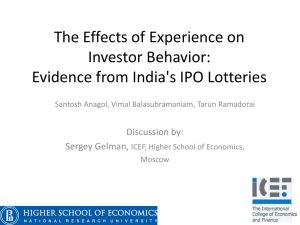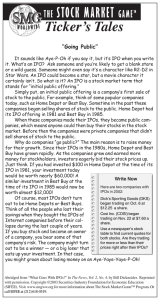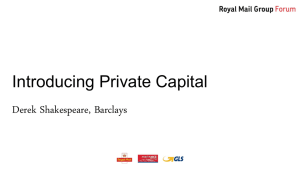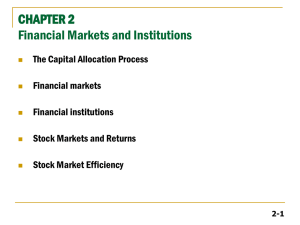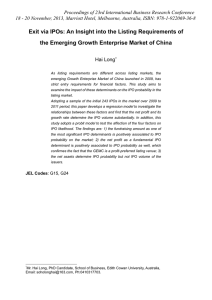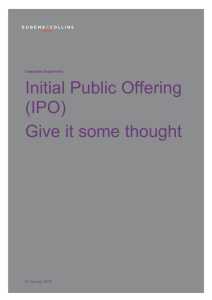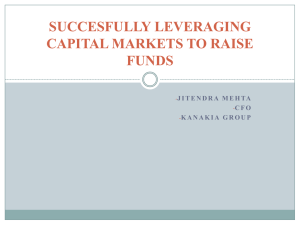Vilar Gave Select Access to IPOs
advertisement
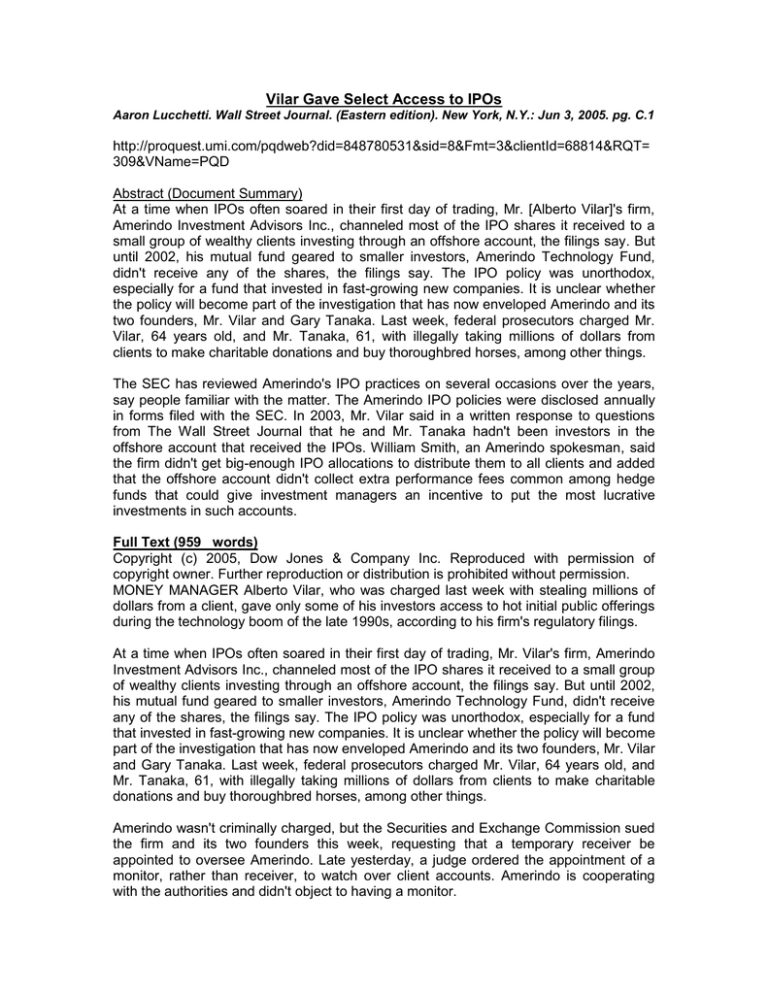
Vilar Gave Select Access to IPOs Aaron Lucchetti. Wall Street Journal. (Eastern edition). New York, N.Y.: Jun 3, 2005. pg. C.1 http://proquest.umi.com/pqdweb?did=848780531&sid=8&Fmt=3&clientId=68814&RQT= 309&VName=PQD Abstract (Document Summary) At a time when IPOs often soared in their first day of trading, Mr. [Alberto Vilar]'s firm, Amerindo Investment Advisors Inc., channeled most of the IPO shares it received to a small group of wealthy clients investing through an offshore account, the filings say. But until 2002, his mutual fund geared to smaller investors, Amerindo Technology Fund, didn't receive any of the shares, the filings say. The IPO policy was unorthodox, especially for a fund that invested in fast-growing new companies. It is unclear whether the policy will become part of the investigation that has now enveloped Amerindo and its two founders, Mr. Vilar and Gary Tanaka. Last week, federal prosecutors charged Mr. Vilar, 64 years old, and Mr. Tanaka, 61, with illegally taking millions of dollars from clients to make charitable donations and buy thoroughbred horses, among other things. The SEC has reviewed Amerindo's IPO practices on several occasions over the years, say people familiar with the matter. The Amerindo IPO policies were disclosed annually in forms filed with the SEC. In 2003, Mr. Vilar said in a written response to questions from The Wall Street Journal that he and Mr. Tanaka hadn't been investors in the offshore account that received the IPOs. William Smith, an Amerindo spokesman, said the firm didn't get big-enough IPO allocations to distribute them to all clients and added that the offshore account didn't collect extra performance fees common among hedge funds that could give investment managers an incentive to put the most lucrative investments in such accounts. Full Text (959 words) Copyright (c) 2005, Dow Jones & Company Inc. Reproduced with permission of copyright owner. Further reproduction or distribution is prohibited without permission. MONEY MANAGER Alberto Vilar, who was charged last week with stealing millions of dollars from a client, gave only some of his investors access to hot initial public offerings during the technology boom of the late 1990s, according to his firm's regulatory filings. At a time when IPOs often soared in their first day of trading, Mr. Vilar's firm, Amerindo Investment Advisors Inc., channeled most of the IPO shares it received to a small group of wealthy clients investing through an offshore account, the filings say. But until 2002, his mutual fund geared to smaller investors, Amerindo Technology Fund, didn't receive any of the shares, the filings say. The IPO policy was unorthodox, especially for a fund that invested in fast-growing new companies. It is unclear whether the policy will become part of the investigation that has now enveloped Amerindo and its two founders, Mr. Vilar and Gary Tanaka. Last week, federal prosecutors charged Mr. Vilar, 64 years old, and Mr. Tanaka, 61, with illegally taking millions of dollars from clients to make charitable donations and buy thoroughbred horses, among other things. Amerindo wasn't criminally charged, but the Securities and Exchange Commission sued the firm and its two founders this week, requesting that a temporary receiver be appointed to oversee Amerindo. Late yesterday, a judge ordered the appointment of a monitor, rather than receiver, to watch over client accounts. Amerindo is cooperating with the authorities and didn't object to having a monitor. Mr. Vilar, whose lawyer has denied the allegations, and Mr. Tanaka, whose lawyer couldn't be reached, are scheduled to appear at bail hearings today. The SEC has reviewed Amerindo's IPO practices on several occasions over the years, say people familiar with the matter. The Amerindo IPO policies were disclosed annually in forms filed with the SEC. In 2003, Mr. Vilar said in a written response to questions from The Wall Street Journal that he and Mr. Tanaka hadn't been investors in the offshore account that received the IPOs. William Smith, an Amerindo spokesman, said the firm didn't get big-enough IPO allocations to distribute them to all clients and added that the offshore account didn't collect extra performance fees common among hedge funds that could give investment managers an incentive to put the most lucrative investments in such accounts. Some observers question whether the firm's less-wealthy mutual-fund investors should have had the same chance to participate in the first- day IPO gains as wealthy investors in the offshore account. "Why entitle one account to buy the IPOs?" asked Tamar Frankel, a law professor at Boston University. While noting that Amerindo disclosed its policy, Ms. Frankel questioned why Amerindo's mutual fund was buying some of the same stocks at higher prices in the months after IPOs. "The adviser should be fair to all clients," she said. The mutual fund now has about $100 million in assets, after an estimated $4.3 million was withdrawn early this week, according to AMG Data Services. In the summer of 1999, Amerindo received 100,000 shares in the IPO of software company Ariba Inc., according to remarks by Mr. Tanaka in a December 2000 Wall Street Journal article. As Ariba's shares soared in the days following the IPO, the Amerindo mutual fund bought 144,000 shares at a price at least twice the IPO price, according to the fund's regulatory filings. The Amerindo spokesman noted that the fund didn't buy Ariba at its peak, but instead bought shares "at a price that was at least 25% cheaper" than the first-day closing price. Amerindo also bought shares for its mutual fund or other clients from 1998 to 2001 after getting shares at a lower IPO price in at least five other companies -- Priceline.com Inc., Portal Software Inc., Juniper Networks Inc., Broadcom Corp. and Internap Network Services Corp., people familiar with the companies said. The investment firm, which manages $1 billion -- down from about $7 billion at the market peak in 2000 -- has said in SEC filings that the offshore investors who got the IPOs had a higher "risk tolerance" than investors in Amerindo's mutual fund and other clients, making IPOs more suitable for the offshore account. Mr. Smith, the spokesman, noted that the fund was marketed as an investment that would buy shares after a company went public, avoiding IPOs to keep away "hot- money" investors whose moves in and out of funds could harm performance. During regular audits of Amerindo in 1992 and 1996, SEC officials reviewed the firm's IPO policy, he added. SEC rules require fund companies to either divide stock, including IPOs, among the funds they manage on a fair basis, or to disclose the method they use. Still, many fund firms manage to share IPOs among hundreds of clients. And regulators recently have been particularly sensitive to situations where money managers have competing loyalties in making investment decisions. Last year, the SEC settled civil charges against a small fund firm for claiming to distribute IPOs among its clients when it actually steered all of its IPO allocations in 1999 to a small fund and one other account it managed. At a court hearing yesterday, a federal judge appointed Robert Knuts, a former SEC lawyer, to monitor the Amerindo accounts and watch over the distribution of the assets to investors and review past transactions. Amerindo's lawyer, Eugene Licker, said the firm has about $500,000 in cash and has outstanding receivables that could bring in additional cash.
